News
The First Traditional Medicine Evidence Summit (TES) was Successfully Held in Guangzhou

On August 16 to 17, 2025, the first First Traditional Medicine Evidence Summit (TES) and the Academic Annual Conference of International Traditional Medicine Clinical Trial Registry (ITMCTR) /China Center for Evidence Based Traditional Chinese Medicine (CCEBTCM) was successfully held in Guangzhou. With the theme of “Evidence-based Guidance·Integrated Wisdom·Innovative Practice”, the conference focused on the frontier directions and core topics of evidence-based research in traditional medicine, and invited senior academicians and industry experts at home and abroad in the fields of evidence-based medicine, artificial intelligence, drug research and development and regulation to exchange and share. The conference was hosted by China Academy of Chinese Medical Sciences, ITMCTR, and CCEBTCM, and hosted by the First Affiliated Hospital of Guangzhou University of Chinese Medicine.
The conference invited Academician WANG Yong-yan, Academician of the Chinese Academy of Engineering and Honorary President of the China Academy of Chinese Medical Sciences, Academician ZHANG Bo-li, Academician of the Chinese Academy of Engineering, Master of Traditional Chinese Medicine, and Honorary President of Tianjin University of Traditional Chinese Medicine, and Academician HUANG Lu-qi, Academician of the Chinese Academy of Engineering and President of the China Academy of Chinese Medical Sciences, as the chairman of the conference. The conference set up a main forum, four parallel forums, two roundtable discussions, two closed-door meetings, a keynote report, a president’s roundtable and a high-level talent exchange meeting.
The conference invited Academician WANG Yong-yan, Academician of the Chinese Academy of Engineering and Honorary President of the China Academy of Chinese Medical Sciences, Academician ZHANG Bo-li, Academician of the Chinese Academy of Engineering, Master of Traditional Chinese Medicine, and Honorary President of Tianjin University of Traditional Chinese Medicine, and Academician HUANG Lu-qi, Academician of the Chinese Academy of Engineering and President of the China Academy of Chinese Medical Sciences, as the chairman of the conference. The conference set up a main forum, four parallel forums, two roundtable discussions, two closed-door meetings, a keynote report, a president’s roundtable and a high-level talent exchange meeting.
1.Main forum
On the morning of August 16, ZHANG Bo-li, academician of the Chinese Academy of Engineering, master of traditional Chinese medicine, and honorary president of Tianjin University of Traditional Chinese Medicine, ZHU Li-guo, chief researcher of the China Academy of Chinese Medical Sciences and academician of the Chinese Academy of Engineering, ZHAO Jun-ning, vice chairman of the 12th National Pharmacopoeia Committee, YANG Hong-jun, vice president of the China Academy of Chinese Medical Sciences, WANG Yao-xian, president of Henan University of Chinese Medicine, HAO Hai-ping, president of China Pharmaceutical University, and WANG Hong-Bin, president of Guangzhou University of Chinese Medicine, KUANG Wei-hong, Secretary of the Party Committee of the First Affiliated Hospital of Guangzhou University of Chinese Medicine, LI Jun, President of the First Affiliated Hospital of Guangzhou University of Chinese Medicine, GAO Wei, General Manager of Unicom Digital Intelligence Medical Technology Co., Ltd., ZHANG Jun-hua, Vice President of Tianjin University of Traditional Chinese Medicine, LI Shao, Academician of the European Academy of Sciences and Arts, and relevant leaders of the National Administration of Traditional Chinese Medicine and the Guangdong Provincial Bureau of Traditional Chinese Medicine attended the main forum. In addition, more than 200 experts and scholars from the fields of traditional Chinese medicine, evidence-based medicine, artificial intelligence and other fields across the country participated in this academic event.
On the morning of August 16, ZHANG Bo-li, academician of the Chinese Academy of Engineering, master of traditional Chinese medicine, and honorary president of Tianjin University of Traditional Chinese Medicine, ZHU Li-guo, chief researcher of the China Academy of Chinese Medical Sciences and academician of the Chinese Academy of Engineering, ZHAO Jun-ning, vice chairman of the 12th National Pharmacopoeia Committee, YANG Hong-jun, vice president of the China Academy of Chinese Medical Sciences, WANG Yao-xian, president of Henan University of Chinese Medicine, HAO Hai-ping, president of China Pharmaceutical University, and WANG Hong-Bin, president of Guangzhou University of Chinese Medicine, KUANG Wei-hong, Secretary of the Party Committee of the First Affiliated Hospital of Guangzhou University of Chinese Medicine, LI Jun, President of the First Affiliated Hospital of Guangzhou University of Chinese Medicine, GAO Wei, General Manager of Unicom Digital Intelligence Medical Technology Co., Ltd., ZHANG Jun-hua, Vice President of Tianjin University of Traditional Chinese Medicine, LI Shao, Academician of the European Academy of Sciences and Arts, and relevant leaders of the National Administration of Traditional Chinese Medicine and the Guangdong Provincial Bureau of Traditional Chinese Medicine attended the main forum. In addition, more than 200 experts and scholars from the fields of traditional Chinese medicine, evidence-based medicine, artificial intelligence and other fields across the country participated in this academic event.
KUANG Wei-hong, Secretary of the Party Committee of the First Affiliated Hospital of Guangzhou University of Chinese Medicine delivered a speech
GAO Wei, General Manager of China Unicom Digital Intelligence Medical Technology Co., Ltd delivered a speech
WANG Hong-bin, President of Guangzhou University of Chinese Medicine delivered a speech
Ghassan Karam, Project Manager of International Clinical Trial Registry Platform delivered a video speech
YANG Hong-jun, Vice President of the China Academy of Chinese Medical Sciences delivered a speech
HAN Qi-de, academician of the Chinese Academy of Sciences delivered a video speech
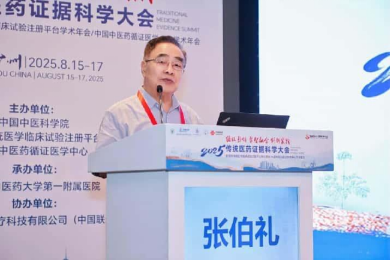
Academician ZHANG Bo-li delivered a speech
The conference officially released three major innovations in the "AI+" series of evidence-based and standard TCM products, one is the "International Traditional Medicine Clinical Trial Registration Ecosystem" covering intelligent content analysis, translation semantic mapping, review collaborative decision-making, and automatic generation of high-quality clinical research plans; second, the CCEBTCM and various sub-centers to create a "TCM Evidence-based and Trusted Data Space Network Base" with clinical data interconnection, security and trustworthiness; "TCM Evidence-based and Trusted Data Space Network Base" and; The third is the "TCM Standard Agent" with the functions of standard intelligent retrieval, standard accurate recommendation and standard auxiliary drafting. In addition, the conference officially launched the clinical guideline development plan of CCEBTCM, which is jointly initiated by CCEBTCM and international high-impact journals to select guideline topics for major global diseases and dominant diseases of traditional Chinese medicine; Together with the world's top methodological teams such as the WHO, the GRADE Working Group, the Cochrane China Centre, and the Campbell China Alliance, we will bring together senior academicians and well-known clinical experts in the field of traditional Chinese medicine and integrative traditional Chinese and Western medicine to develop authoritative guidelines for integrative traditional Chinese and Western medicine with international credibility and clinical enforceability.
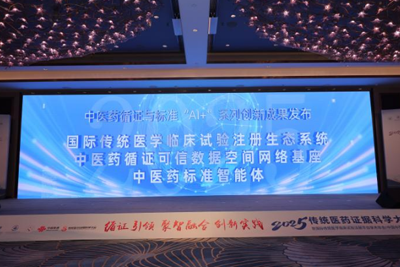
The "Al+" series of innovative achievements in evidence-based traditional Chinese medicine and standard were released
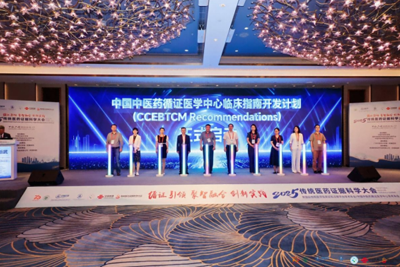
The launching ceremony of the clinical guideline development program of CCEBTCM
In the keynote report session, the participating experts exchanged themes on the current situation and development of evidence-based medicine, the improvement of the quality of evidence in traditional medicine driven by openness and transparency, and the new drugs of traditional Chinese medicine.
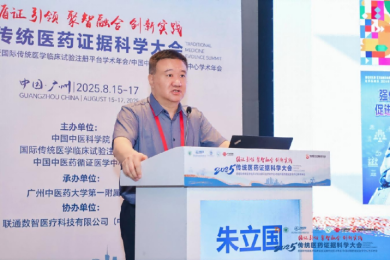
ZHU Li-guo, academician of the Chinese Academy of Engineering, made a keynote report
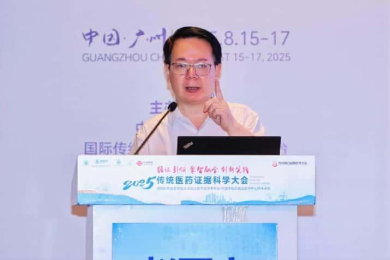
ZHAO Jun-ning, vice chairman of the 12th National Pharmacopoeia Committee made a keynote speech
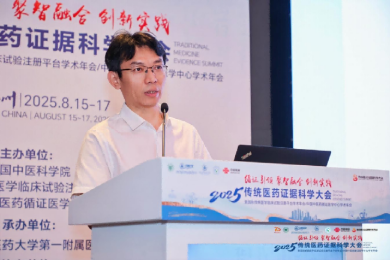
HAO Hai-ping, President of China Pharmaceutical University, made a keynote speech
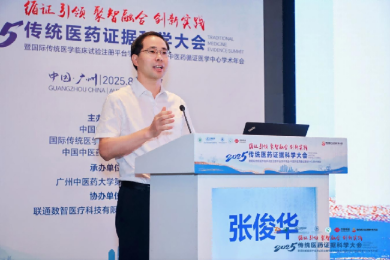
ZHANG Jun-hua, Vice President of Tianjin University of Traditional Chinese Medicine, made a keynote speech
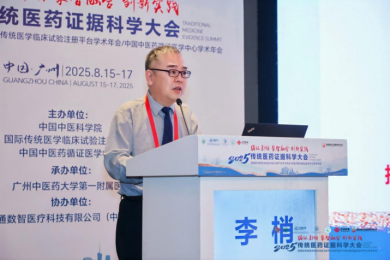
LI Shao, professor of Tsinghua University, gave a keynote speech
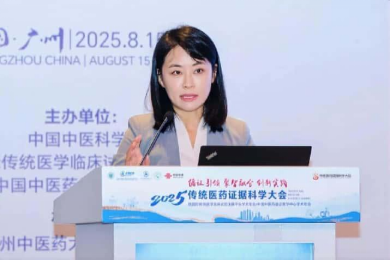
SHI Nan-nan, administrator of ITMCTR, gave a keynote speech
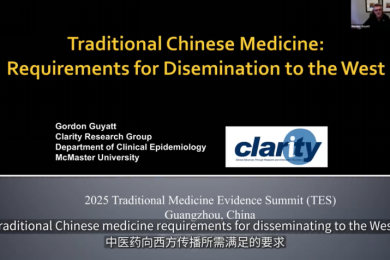
Gordon Henry Guyatt, member of the Royal Canadian Academy of Sciences and founder of
evidence-based medicine, reported online
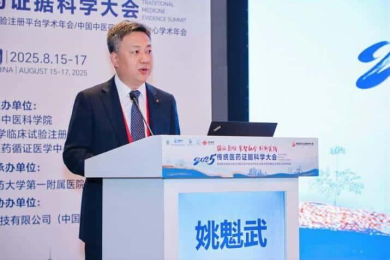
YAO Kui-wu, Director of the Academic Department of the China Academy of Chinese Medical Sciences, presided over the meeting

LI Jun, The President of the First Affiliated Hospital of Guangzhou University of Chinese Medicine , presided over the meeting
2.Keynote report
At noon on the 17th, HUANG Lu-qi, academician of the Chinese Academy of Engineering and president of the China Academy of Chinese Medical Sciences, gave a keynote speech on the theme of "Digital Intelligence Evidence-Based Medicine: New Directions for Evidence-Based Research and Practice in the AI Era"
At noon on the 17th, HUANG Lu-qi, academician of the Chinese Academy of Engineering and president of the China Academy of Chinese Medical Sciences, gave a keynote speech on the theme of "Digital Intelligence Evidence-Based Medicine: New Directions for Evidence-Based Research and Practice in the AI Era"
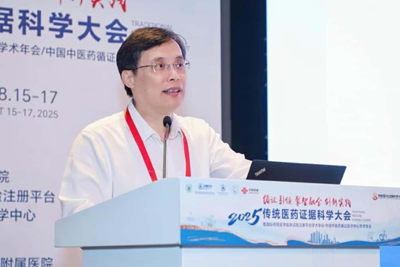
HUANG Lu-qi, academician of the Chinese Academy of Engineering and president of the China Academy of Chinese Medical Sciences, gave a keynote speech
3.Parallel Forum 1: Evidence-based Foundation Building and Standard Empowerment
On the afternoon of August 16, the first parallel forum was themed "Research on Common Technologies and Evidence-Based Methods for Standardization of Traditional Chinese Medicine", closely following the core needs of the modernization of traditional Chinese medicine, and focusing on "Evidence Production-of "evaluation" and "standard guideline development-application-promotion" are carried out, and the whole chain innovation path of the construction of TCM characteristic evidence system and standard transformation is systematically discussed.
The forum invited eight well-known experts and scholars from the fields of traditional Chinese medicine and evidence-based medicine, university presidents and hospital presidents from all over the country to give special reports. The experts shared the latest research progress on evidence-based and standards, and took the remote management project of tumor symptoms as an example to discuss the enlightenment of international evidence-based methods on the development of traditional Chinese medicine in our country. Combined with the evidence-based evaluation of service standards, the construction of evidence chain for acupuncture and drug rehabilitation, and the construction of clinical outcome evaluation system of traditional Chinese medicine, the multi-dimensional application of evidence-based concepts in standard formulation and practice was demonstrated. The reports of the participating experts not only focused on the cutting-edge hot spots of evidence-based research in traditional Chinese medicine, but also presented the latest achievements in the formulation of clinical guidelines, the application of standard methods and the transformation of clinical research, providing new ideas and paths for the construction and standardization of the evidence system of traditional Chinese medicine. In addition, representative of CCEBTCM gave a report on the topic of "Methods and Practices of Evidence-based Guidelines for Multi-scenario Evidence-based Guidelines in Traditional Chinese Medicine", providing practical cases and experience sharing for the promotion and application of evidence-based guidelines in different scenarios.
On the afternoon of August 16, the first parallel forum was themed "Research on Common Technologies and Evidence-Based Methods for Standardization of Traditional Chinese Medicine", closely following the core needs of the modernization of traditional Chinese medicine, and focusing on "Evidence Production-of "evaluation" and "standard guideline development-application-promotion" are carried out, and the whole chain innovation path of the construction of TCM characteristic evidence system and standard transformation is systematically discussed.
The forum invited eight well-known experts and scholars from the fields of traditional Chinese medicine and evidence-based medicine, university presidents and hospital presidents from all over the country to give special reports. The experts shared the latest research progress on evidence-based and standards, and took the remote management project of tumor symptoms as an example to discuss the enlightenment of international evidence-based methods on the development of traditional Chinese medicine in our country. Combined with the evidence-based evaluation of service standards, the construction of evidence chain for acupuncture and drug rehabilitation, and the construction of clinical outcome evaluation system of traditional Chinese medicine, the multi-dimensional application of evidence-based concepts in standard formulation and practice was demonstrated. The reports of the participating experts not only focused on the cutting-edge hot spots of evidence-based research in traditional Chinese medicine, but also presented the latest achievements in the formulation of clinical guidelines, the application of standard methods and the transformation of clinical research, providing new ideas and paths for the construction and standardization of the evidence system of traditional Chinese medicine. In addition, representative of CCEBTCM gave a report on the topic of "Methods and Practices of Evidence-based Guidelines for Multi-scenario Evidence-based Guidelines in Traditional Chinese Medicine", providing practical cases and experience sharing for the promotion and application of evidence-based guidelines in different scenarios.
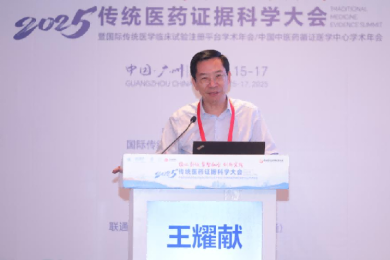
WANG Yao-xian, President of Henan University of Chinese Medicine, made a report
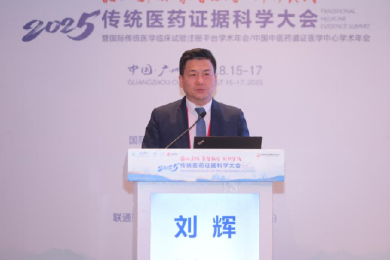
LIU Hui, Vice President of the Third Affiliated Hospital of Naval Medical University, made a report
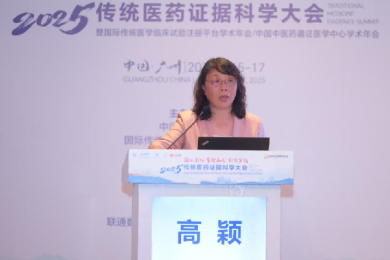
GAO Ying, Dean of the Institute of Traditional Chinese Encephalopathy of Beijing University of Chinese Medicine, made a report
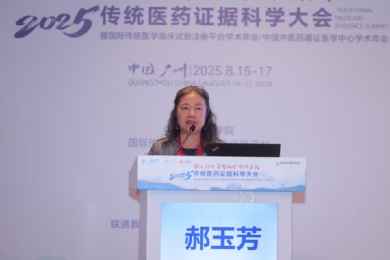
HAO Yu-fang, Vice President of the International Institute of Evidence-based Traditional Chinese Medicine of Beijing University of Chinese Medicine, made a report
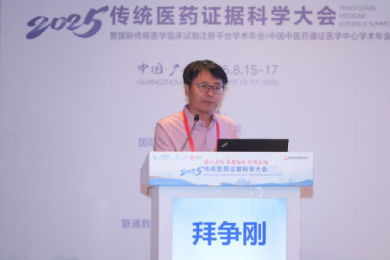
BAI Zheng-gang, professor of the Center for Evidence-Based Medicine of Traditional Chinese Medicine of Nanjing University of Chinese Medicine, made a report
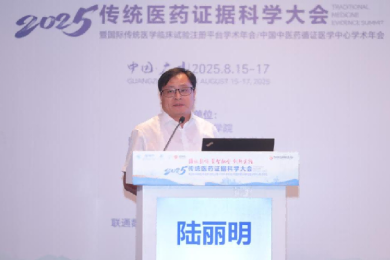
LU Li-ming, head of the Acupuncture Big Data Laboratory of Guangzhou University of Chinese Medicine, made a report
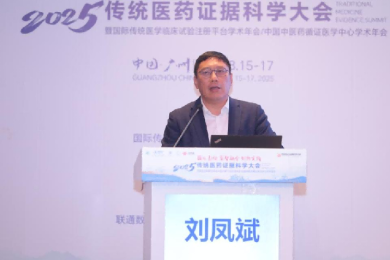
LIU Feng-bin, Secretary of the Party Committee of Baiyun Hospital, the First Affiliated Hospital of Guangzhou University of Chinese Medicine, made a report
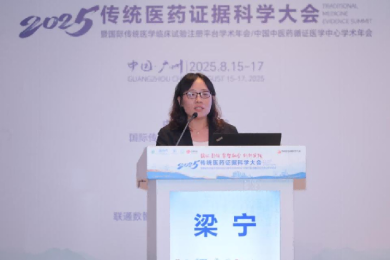
LIANG Ning, an associate researcher at CCEBTCM, made a report
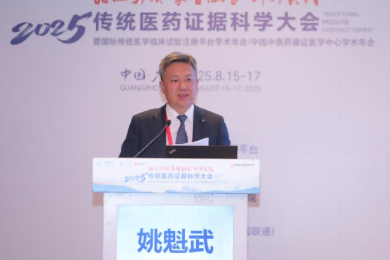
YAO Kui-wu, Director of the Academic Department of the China Academy of Chinese Medical Sciences, presided over the meeting
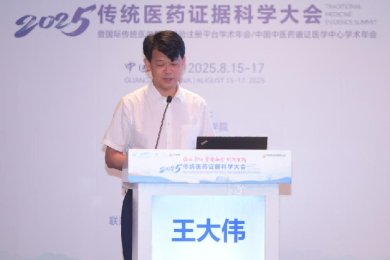
WANG Da-wei, Vice President of the First Affiliated Hospital of Guangzhou University of Chinese Medicine,presided over the meeting
The roundtable discussion session focused on "method innovation and journal leadership driving clinical trial quality improvement", focusing on the pain points of the whole chain of clinical research "design-registration-publication-application". The discussion invited eight guests, including the head of the operation of the international traditional medicine clinical trial registration platform, clinical research experts, and high-quality journal editors, and was chaired by YAO Kui-wu. The discussion closely followed practical concerns, and deeply discussed how to build a solid bottom line of scientific research ethics through clinical trial registration norms and eliminate publication bias through a transparent mechanism. how to use methodological innovation to improve the scientificity and rigor of research design and deal with complex medical problems; and how high-quality journals can reverse the improvement of research quality through review standards and academic norms. Experts at the meeting agreed that multi-party collaboration and system optimization are needed to promote the formation of a more open, transparent and efficient clinical research ecology.
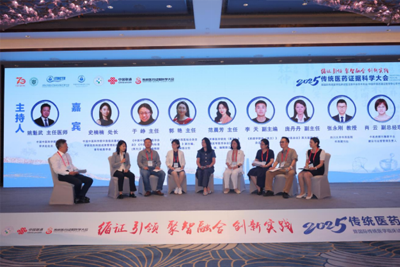
The panelists at the roundtable from left to right were: Yao Kuiwu, Director of the Academic Department of the China Academy of Chinese Medical Sciences, Shi Nannan, administrator of ITMCTR, Zhang Yonggang, Professor of West China Journals of West China Hospital of Sichuan University, Xiao Yun, Head of Construction and Operation Management of the Cluster Platform of Traditional Chinese Medicine, Guo Yan, Deputy Editor-in-Chief and Director of the Editorial Department of the Chinese Journal of Integrative Chinese and Western Medicine, Fan Chenfang, Executive Editor-in-Chief and Director of the Editorial Department of the People's Liberation Army Medical Journal of Military Medical Research (English), Yu Zheng, Director of the Editorial Department of the Chinese Journal of Basic Chinese Medicine and Traditional Chinese Medicine Norms and Standards (English), Li Tian, Deputy Editor-in-Chief of the Journal of Pharmacology Research, and Pang Dandan, Deputy Director of the Journal of Traditional Chinese Medicine
4.Parallel Forum 2: Intelligent Drive and Evidence Breakthrough
At the same time, the second parallel forum with the theme of "Intelligent Exploration of the Whole Chain of Evidence-based Research in Traditional Chinese Medicine" closely follows the bottleneck of quality improvement and transformation efficiency of evidence-based research in traditional Chinese medicine, and focuses on the enabling role of artificial intelligence technology in the whole chain of evidence generation, evaluation and application, and systematically discusses the innovative path of solving evidence-based dilemmas and reshaping the transformation ecology.
The forum invited eight well-known experts and scholars from the intersection of traditional Chinese medicine, evidence-based medicine and artificial intelligence to give special reports. The participating experts shared the latest research results and practical experience on the application of artificial intelligence in pharmaceutical research, the exploration of traditional Chinese medicine agents driven by large models, the development of the whole chain of evidence-based research promoted by digital intelligence technology, the data-driven research on the structure-function-target annotation of traditional Chinese medicine ingredients, the development of SmartEBM toolkits, the artificial intelligence pilot base to help evidence-based research, the automatic positioning method of acupuncture points, and the construction of evidence-based and trusted data space network bases. The expert report not only focuses on the cutting-edge hot spots of the combination of artificial intelligence and traditional Chinese medicine, but also demonstrates the application practice of evidence-based research in the real world, providing new ideas for the intelligent development of evidence-based research in traditional Chinese medicine. In addition, representative of CCEBTCM gave a report on the topic of "Construction of the Network Base of Evidence-Based and Trusted Data Space in Traditional Chinese Medicine", systematically expounded the overall design ideas and key technical paths of the base, and demonstrated the latest progress in building a safe, credible and shareable digital and intelligent infrastructure for evidence-based research in traditional Chinese medicine through cutting-edge technologies such as multi-layer security architecture, privacy computing and blockchain traceability, which provided strong support for promoting the high-quality development of evidence-based research in traditional Chinese medicine.
At the same time, the second parallel forum with the theme of "Intelligent Exploration of the Whole Chain of Evidence-based Research in Traditional Chinese Medicine" closely follows the bottleneck of quality improvement and transformation efficiency of evidence-based research in traditional Chinese medicine, and focuses on the enabling role of artificial intelligence technology in the whole chain of evidence generation, evaluation and application, and systematically discusses the innovative path of solving evidence-based dilemmas and reshaping the transformation ecology.
The forum invited eight well-known experts and scholars from the intersection of traditional Chinese medicine, evidence-based medicine and artificial intelligence to give special reports. The participating experts shared the latest research results and practical experience on the application of artificial intelligence in pharmaceutical research, the exploration of traditional Chinese medicine agents driven by large models, the development of the whole chain of evidence-based research promoted by digital intelligence technology, the data-driven research on the structure-function-target annotation of traditional Chinese medicine ingredients, the development of SmartEBM toolkits, the artificial intelligence pilot base to help evidence-based research, the automatic positioning method of acupuncture points, and the construction of evidence-based and trusted data space network bases. The expert report not only focuses on the cutting-edge hot spots of the combination of artificial intelligence and traditional Chinese medicine, but also demonstrates the application practice of evidence-based research in the real world, providing new ideas for the intelligent development of evidence-based research in traditional Chinese medicine. In addition, representative of CCEBTCM gave a report on the topic of "Construction of the Network Base of Evidence-Based and Trusted Data Space in Traditional Chinese Medicine", systematically expounded the overall design ideas and key technical paths of the base, and demonstrated the latest progress in building a safe, credible and shareable digital and intelligent infrastructure for evidence-based research in traditional Chinese medicine through cutting-edge technologies such as multi-layer security architecture, privacy computing and blockchain traceability, which provided strong support for promoting the high-quality development of evidence-based research in traditional Chinese medicine.
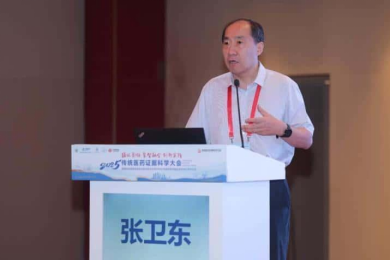
ZHANG Wei-dong, a Yangtze River scholar and director of the Modern Traditional Chinese Medicine Research Center of the Naval Medical University, made a report
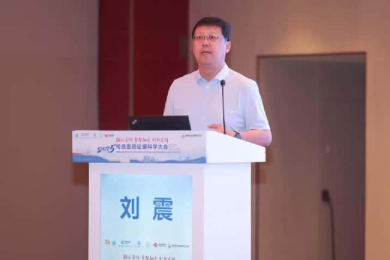
LIU Zhen, secretary of the Party Committee of Guang'anmen Hospital of the China Academy of Chinese Medical Sciences, made a report
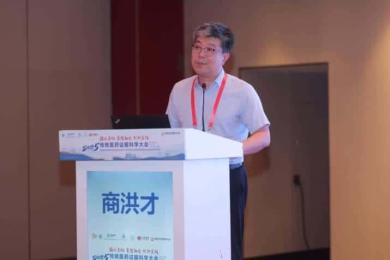
SHANG Hong-cai, President of Oriental Hospital of Beijing University of Chinese Medicine, made a report
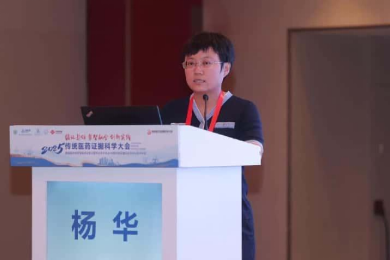
YANG Hua, a Yangtze River scholar, executive deputy director of the State Key Laboratory of Multi-target Natural Medicines, and a professor at China Pharmaceutical University, made a report
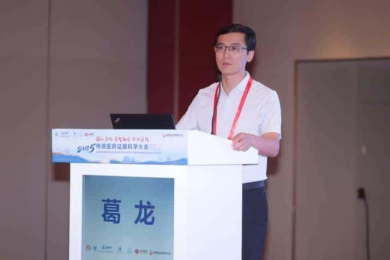
GE Long, a young Yangtze River scholar and professor of Lanzhou University, made a report
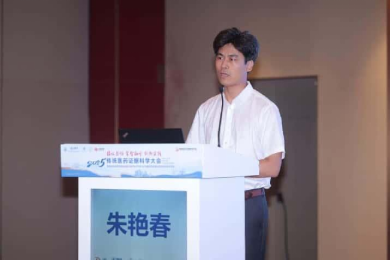
ZHU Yan-chun, chief medical information officer of China Unicom Digital Intelligence Medical Technology Co., Ltd., made a report
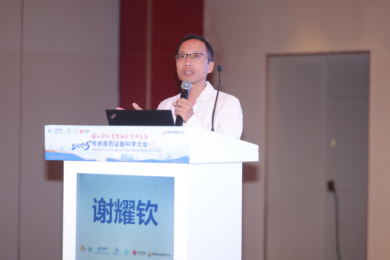
XIE Yao-qin, a researcher at the Shenzhen Institute of Advanced Technology of the Chinese Academy of Sciences, gave a report
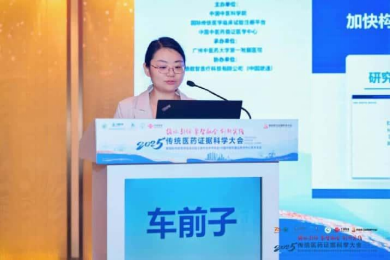
CHE Qian-zi,an assistant researcher at CCEBTCM, gave a report
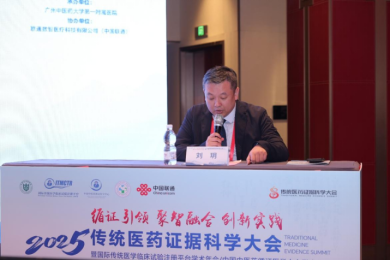
LIU Yue, Executive Vice President of Suzhou Hospital of Xiyuan Hospital of China Academy of Chinese Medical Sciences, presided over the meeting
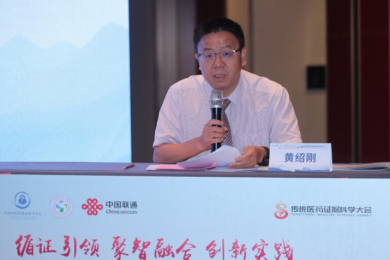
HUANG Shao-gang, Vice President of the First Affiliated Hospital of Guangzhou University of Chinese Medicine, presided over the meeting
The forum specially set up a roundtable discussion session, focusing on "integrity and innovation in the development of traditional Chinese medicine in the era of artificial intelligence". Five guests were invited to the discussion, chaired by Huang Shaogang. The guests closely followed the theme and deeply discussed the application scenarios, development paths and potential risks of artificial intelligence in evidence-based research of traditional Chinese medicine, emphasizing the need to adhere to the core concept of traditional Chinese medicine while empowering technology, and promote the organic unity of integrity and innovation.
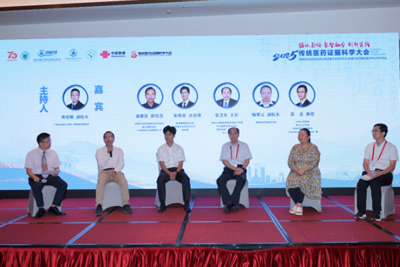
From left to right, the roundtable discussion was: Xie Yaoqin, researcher of Shenzhen Institute of Advanced Technology, Chinese Academy of Sciences, Zhu Yanchun, chief medical information officer of China Unicom Digital Intelligence Medical Technology Co., Ltd., Zhang Weidong, director of the Modern Traditional Chinese Medicine Research Center of Naval Medical University, Yu Cuiyun, vice president of Hunan Institute of Traditional Chinese Medicine, and Ge Long, professor of Lanzhou University
5.Closed-door meeting: Coordinate to promote evidence-based capacity building
On the evening of August 16th, Work Meeting of Sub-centers of CCEBTCM and Kick-off Meeting of the "Multidisciplinary Cross-innovation Team for International Registration of Clinical Research and Evidence-Based Practice of Traditional Chinese Medicine" project, and International Consortium of Evidence-Based Traditional and Integrative Medicine (ICE-TIM) work meeting were successfully held. More than 60 experts or representatives attended the meeting, including representatives of the first batch of 6 sub-centers of CCEBTCM, co-founders of 5 international evidence-based traditional medicine technology communities, and representatives of 21 units of the National Center for the Inheritance and Innovation of Traditional Chinese Medicine. The meeting was presided over by YANG Hong-jun, vice president of the China Academy of Chinese Medical Sciences.
On the evening of August 16th, Work Meeting of Sub-centers of CCEBTCM and Kick-off Meeting of the "Multidisciplinary Cross-innovation Team for International Registration of Clinical Research and Evidence-Based Practice of Traditional Chinese Medicine" project, and International Consortium of Evidence-Based Traditional and Integrative Medicine (ICE-TIM) work meeting were successfully held. More than 60 experts or representatives attended the meeting, including representatives of the first batch of 6 sub-centers of CCEBTCM, co-founders of 5 international evidence-based traditional medicine technology communities, and representatives of 21 units of the National Center for the Inheritance and Innovation of Traditional Chinese Medicine. The meeting was presided over by YANG Hong-jun, vice president of the China Academy of Chinese Medical Sciences.
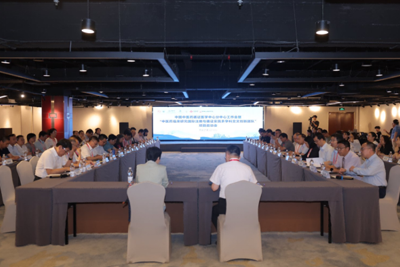
Group photo of Work Meeting of Sub-centers of CCEBTCM and Kick-off Meeting of the "Multidisciplinary Cross-innovation Team for International Registration of Clinical Research and Evidence-Based Practice of Traditional Chinese Medicine" project, and ICE-TIM work meeting
The meeting focused on the construction plan and construction tasks of sub-centers of CCEBTCM, as well as the implementation plan of the international registration of clinical research and evidence-based practice of traditional Chinese medicine, the ICE-TIM charter and work plan. The meeting conveyed the four core goals of the "15th Five-Year Plan" evidence-based capacity improvement: building an evidence-based database for key diseases, carrying out top-level design of clinical research plans, establishing an expert pool to cultivate talents, and improving the ability and platform collaboration network of advantageous diseases. The meeting further deepened evidence-based capacity building, laid a solid foundation for the implementation of the integration of resource advantages of various units, and the construction of a national efficient and collaborative research network, systematically enhanced the scientific connotation interpretation and efficacy evaluation level of traditional Chinese medicine, significantly improved the service capacity and international influence of traditional Chinese medicine, and provided key support for the modernization and global development of traditional Chinese medicine.
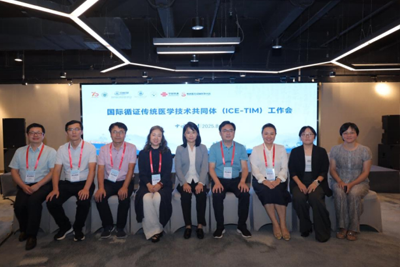
Group photo of ICE-TIM working meeting
6.Parallel Forum 3: Evidence Integration and Evidence-Based Decision-Making
On the morning of August 17, the third parallel forum was held with the theme of "Comprehensive Clinical Evaluation Technology and Decision Transformation of Drugs", focusing on the challenges of drug value assessment in the context of deepening medical reform, discussing key technologies for comprehensive clinical evaluation of drugs, multi-scenario application methods such as medical and health decision-making transformation, solving problems such as market access of traditional Chinese medicine, and helping to improve traditional Chinese medicine service capabilities.
The forum invited seven authoritative experts from the fields of drug regulatory science, pharmacoeconomics, and medical insurance payment reform to give special reports. In the special report session, the participating experts shared the application of the integrated chain of evidence method in the evaluation of the safety and effectiveness of traditional Chinese medicines, discussed the proportion and allocation of drug costs in medical institutions, interpreted the management guidelines and latest work progress of comprehensive clinical evaluation of drugs, analyzed the advantages and disadvantages of different types of drug economic evaluation, focused on the practice and development of pharmacoeconomic evaluation of proprietary Chinese medicines, and shared the comprehensive clinical evaluation and drug treatment path of drugs. In addition, representative of tCCEBTCM gave a report on the topic of "Technical Guiding Principles and Practice of Clinical Comprehensive Evaluation of Proprietary Chinese Medicines", which provided a comprehensive reference for the standardized development and achievement transformation of comprehensive clinical evaluation of proprietary Chinese medicines.
On the morning of August 17, the third parallel forum was held with the theme of "Comprehensive Clinical Evaluation Technology and Decision Transformation of Drugs", focusing on the challenges of drug value assessment in the context of deepening medical reform, discussing key technologies for comprehensive clinical evaluation of drugs, multi-scenario application methods such as medical and health decision-making transformation, solving problems such as market access of traditional Chinese medicine, and helping to improve traditional Chinese medicine service capabilities.
The forum invited seven authoritative experts from the fields of drug regulatory science, pharmacoeconomics, and medical insurance payment reform to give special reports. In the special report session, the participating experts shared the application of the integrated chain of evidence method in the evaluation of the safety and effectiveness of traditional Chinese medicines, discussed the proportion and allocation of drug costs in medical institutions, interpreted the management guidelines and latest work progress of comprehensive clinical evaluation of drugs, analyzed the advantages and disadvantages of different types of drug economic evaluation, focused on the practice and development of pharmacoeconomic evaluation of proprietary Chinese medicines, and shared the comprehensive clinical evaluation and drug treatment path of drugs. In addition, representative of tCCEBTCM gave a report on the topic of "Technical Guiding Principles and Practice of Clinical Comprehensive Evaluation of Proprietary Chinese Medicines", which provided a comprehensive reference for the standardized development and achievement transformation of comprehensive clinical evaluation of proprietary Chinese medicines.
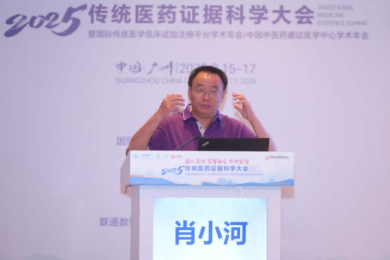
XIAO Xiao-he, Director of the Academic Committee of the Department of Hepatology of the General Hospital of the Chinese People's Liberation Army and Director of the Institute of Traditional Chinese Medicine of the Army, made a report
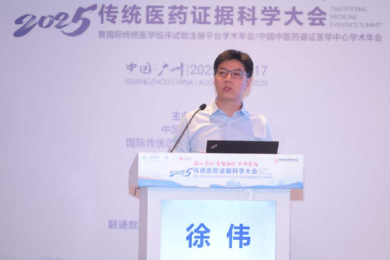
XU Wei, Vice Dean of the International Pharmaceutical Business School of China Pharmaceutical University, made a report
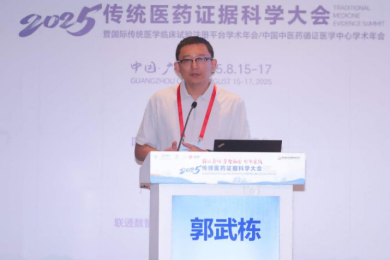
GUO Wu-dong, Director of the Health Technology Comprehensive Research Office of the Health Development Research Center of the National Health Commission, made a report
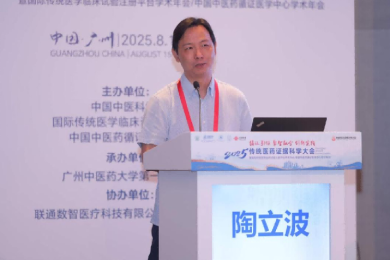
TAO Li-bo, Deputy Director of the Health Policy and Technology Evaluation Report Center of Peking University School of Medicine, made a report
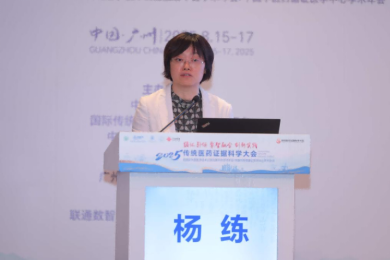
YANG Lian, Vice Dean of the School of Public Health of Chengdu University of Traditional Chinese Medicine, made a report
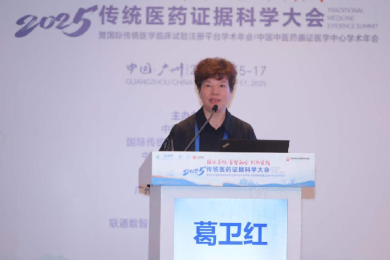
GE Wei-hong, director of the Department of Pharmacy of Gulou Hospital Affiliated to Nanjing University School of Medicine, made a report
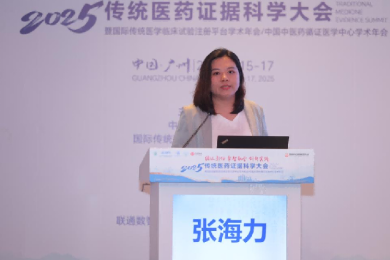
ZHANG Hai-li, assistant researcher of CCEBTCM, gave a report
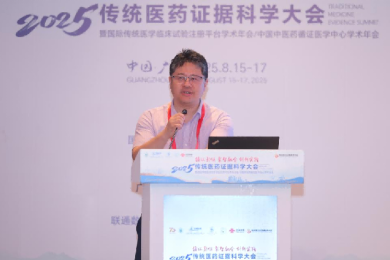
WEI Xu, vice president of Wangjing Hospital of the China Academy of Chinese Medical Sciences, presided over the meeting
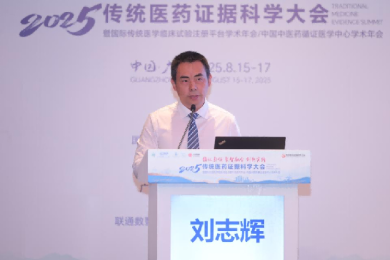
LIU Zhi-hui, Secretary of the Party Committee of Shenshan Hospital, the First Affiliated Hospital of Guangzhou University of Chinese Medicine, presided over the meeting
7.Parallel Forum 4: Evidence Research and New Drug Quality
On the morning of the same day, the fourth parallel forum focused on the theme of "Evidence Transformation and Technological Innovation in the R&D of New Drugs in Diversified Traditional Chinese Medicine", focusing on the generation of high-quality human experience evidence; through this forum, these topics were discussed in depth, and the scientific, standardized and efficient research and development of new Chinese medicine drugs was promoted.
The forum invited seven well-known experts and scholars, university presidents and hospital presidents from the fields of traditional Chinese medicine and evidence-based medicine across the country to give special reports. In the special report session, the participating experts shared the latest progress and experience on the advantages of traditional medicine, the enlightenment, opportunities and challenges of the research and development and transformation of traditional Chinese medicine preparations under the "three combinations" review system. At the same time, the clinical practice of membranous nephropathy was also taken as an example to discuss the enlightenment of scientific research based on classic prescriptions; and combined with the clinical evaluation ideas and methods of new drugs of syndrome, the multi-dimensional application of evidence-based concepts in standard formulation and practice was demonstrated. The reports of the participating experts focused on the evidence system of TCM registration and review that combines TCM theory, human experience and clinical trials, and through a series of discussions, it aims to promote the optimization and upgrading of the TCM industry and help establish a new drug creation model that meets the characteristics of TCM. In addition, representative from CCEBTCM reported on the theme of "Construction of TCM Theoretical Research System for the "Three Combinations" Review Evidence System.
On the morning of the same day, the fourth parallel forum focused on the theme of "Evidence Transformation and Technological Innovation in the R&D of New Drugs in Diversified Traditional Chinese Medicine", focusing on the generation of high-quality human experience evidence; through this forum, these topics were discussed in depth, and the scientific, standardized and efficient research and development of new Chinese medicine drugs was promoted.
The forum invited seven well-known experts and scholars, university presidents and hospital presidents from the fields of traditional Chinese medicine and evidence-based medicine across the country to give special reports. In the special report session, the participating experts shared the latest progress and experience on the advantages of traditional medicine, the enlightenment, opportunities and challenges of the research and development and transformation of traditional Chinese medicine preparations under the "three combinations" review system. At the same time, the clinical practice of membranous nephropathy was also taken as an example to discuss the enlightenment of scientific research based on classic prescriptions; and combined with the clinical evaluation ideas and methods of new drugs of syndrome, the multi-dimensional application of evidence-based concepts in standard formulation and practice was demonstrated. The reports of the participating experts focused on the evidence system of TCM registration and review that combines TCM theory, human experience and clinical trials, and through a series of discussions, it aims to promote the optimization and upgrading of the TCM industry and help establish a new drug creation model that meets the characteristics of TCM. In addition, representative from CCEBTCM reported on the theme of "Construction of TCM Theoretical Research System for the "Three Combinations" Review Evidence System.
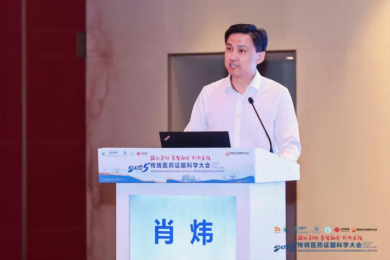
XIAO Wei, Vice President of Guangdong Pharmaceutical University, made a report
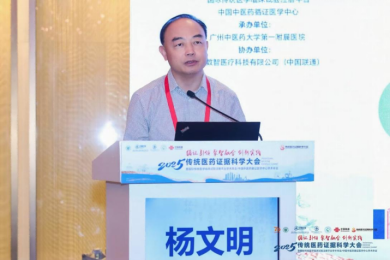
YANG Wen-ming, President of the First Affiliated Hospital of Anhui University of Chinese Medicine, made a report
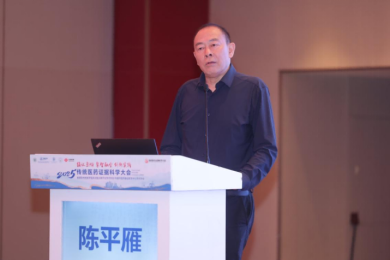
CHEN Ping-yan, Executive Director of Hainan Real World Data Research Institute, made a report
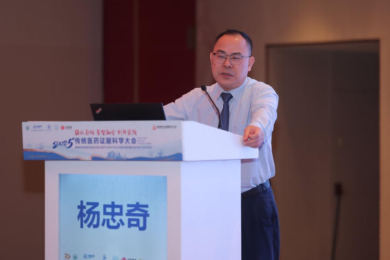
YANG Zhong-qi, a Yangtze River scholar and vice president of the First Affiliated Hospital of Guangzhou University of Chinese Medicine, made a report
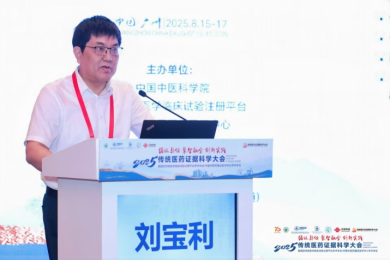
LIU Bao-li, Executive Vice President of Beijing Hospital of Traditional Chinese Medicine Affiliated to Capital Medical University, made a report
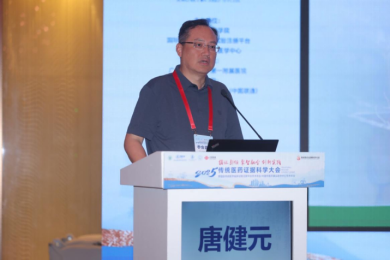
TANG Jian-yuan, Yangtze River Scholar and Vice President of the Affiliated Hospital of Chengdu University of Traditional Chinese Medicine, made a report
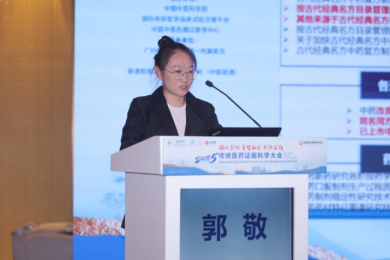
GUO Jing, associate researcher ofCCEBTCM, made a report
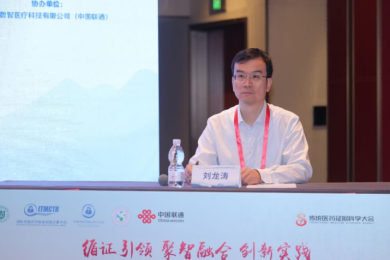
LIU Long-tao, vice president of Guang'anmen Hospital of the China Academy of Chinese Medical Sciences, presided over the meeting
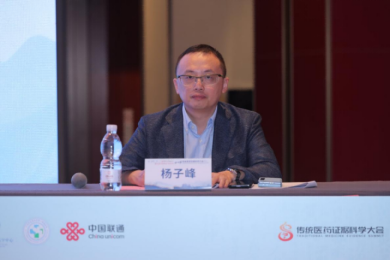
YANG Zi-feng, Vice President of Guangzhou Institute of Respiratory Health, First Affiliated Hospital of Guangzhou Medical University, presided over the meeting
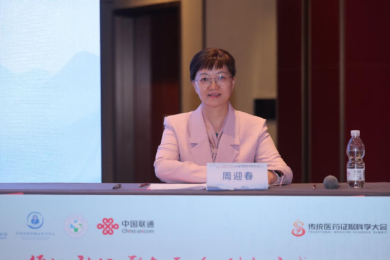
ZHOU Ying-chun, President of Baiyun Hospital, First Affiliated Hospital of Guangzhou University of Chinese Medicine, presided over the meeting
8.President's Roundtable Forum: Focus on value realization and transformation
On the afternoon of August 17, the President's Roundtable Forum of the Traditional Medicine Evidence Science Conference was held one after another, focusing on the two core topics of "selection in the medical insurance catalogue of Chinese patent medicines and exploration of value realization mechanisms in hospitals" and "efficient transformation strategies of traditional Chinese medicine preparations in medical institutions".
On the afternoon of August 17, the President's Roundtable Forum of the Traditional Medicine Evidence Science Conference was held one after another, focusing on the two core topics of "selection in the medical insurance catalogue of Chinese patent medicines and exploration of value realization mechanisms in hospitals" and "efficient transformation strategies of traditional Chinese medicine preparations in medical institutions".
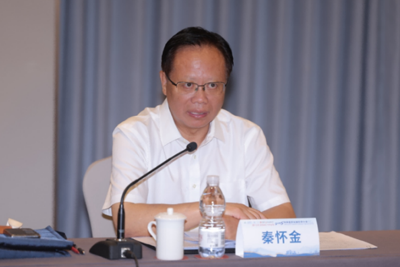
QIN Huai-jin, deputy leader of the leading group and leader of the working group for the preparation of the 2024 World Conference on Traditional Medicine, presided over the meeting
The forum was presided over by QIN Huai-jin, deputy leader of the leading group and leader of the working group for the preparation of the 2024 World Conference on Traditional Medicine. The forum invited party secretaries, presidents and vice presidents from 14 tertiary hospitals from 12 provinces and municipalities directly under the Central Government, including Beijing, Tianjin, Shanghai, Anhui, Jiangxi, Shandong, Zhejiang, Guangzhou, Guizhou, Shaanxi and Xinjiang. The participating experts not only covered many fields such as traditional Chinese medicine clinical, pharmacy, medical insurance, scientific research and management, but also covered major regions in the east, central and western regions. Based on the practical experience and research results of their respective hospitals, they provided multi-angle and all-round ideas and suggestions for the topic discussion. Focusing on hot issues such as the realization of medical insurance payment and hospital application of proprietary Chinese medicines, as well as the transformation path of traditional Chinese medicine preparations in medical institutions, in-depth exchanges and active suggestions.
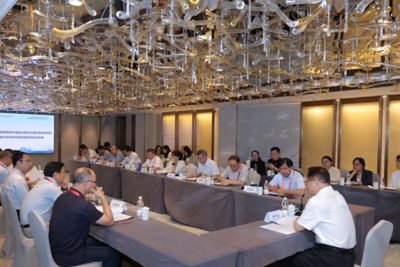
President's roundtable forum
During the discussion, the participating experts reached a preliminary consensus: first, we should adhere to clinical value as the core, promote the establishment of a closed-loop management mechanism covering "selection-use-evaluation-optimization" of proprietary Chinese medicines, and gradually improve the institutionalized path of the connection between the identification of advantageous diseases and medical insurance payment; second, the efficient transformation of traditional Chinese medicine preparations in medical institutions should be based on clinical needs, scientifically select high-quality varieties, improve quality standards, process optimization and clinical research design, and promote cross-regional and cross-institutional collaboration models to continuously improve the efficiency of achievement transformation.
The President's roundtable forum not only summarized the common problems restricting the development of proprietary Chinese medicines and traditional Chinese medicine preparations in medical institutions, but also put forward practical ideas that take into account the coordination of clinical, pharmacy, medical insurance and other departments. Through cross-border cooperation in scientific research, medical care, medical insurance and industry, the forum provides new ideas and reference directions for the optimization of medical insurance payment policies for proprietary Chinese medicines and the efficient transformation of traditional Chinese medicine preparations in medical institutions. Experts at the meeting agreed that the successful holding of the forum will help accelerate the formation of a systematic, replicable and generalizable path to realize the value of traditional Chinese medicine, and further promote the inheritance, innovation and high-quality development of traditional Chinese medicine.
The President's roundtable forum not only summarized the common problems restricting the development of proprietary Chinese medicines and traditional Chinese medicine preparations in medical institutions, but also put forward practical ideas that take into account the coordination of clinical, pharmacy, medical insurance and other departments. Through cross-border cooperation in scientific research, medical care, medical insurance and industry, the forum provides new ideas and reference directions for the optimization of medical insurance payment policies for proprietary Chinese medicines and the efficient transformation of traditional Chinese medicine preparations in medical institutions. Experts at the meeting agreed that the successful holding of the forum will help accelerate the formation of a systematic, replicable and generalizable path to realize the value of traditional Chinese medicine, and further promote the inheritance, innovation and high-quality development of traditional Chinese medicine.
9.High-level talent exchange meeting: interdisciplinary driving innovation
On the afternoon of the 17th, the high-level talent exchange meeting was successfully held. The forum invited 12 experts and scholars from the fields of traditional Chinese medicine, evidence-based medicine and standardization across the country to give conference reports, of which more than 70% of the young experts won the title of national talents. The forum focused on key technological breakthroughs and clinical transformation path innovations driven by multidisciplinary interdisciplinary research and development of new traditional Chinese medicine drugs, and made special reports on disease mechanisms and intervention methods, multi-omics and precision medicine research, evidence-based and standardized methods, etc., and promoted scientific research collaboration and integrated innovation of traditional Chinese medicine through interdisciplinary in-depth collisions. In addition, four representatives from CCEBTCM reported on the development of traditional Chinese medicine standardization, the theory of new crown traditional Chinese medicine based on evidence-based evidence, the value-oriented pricing of proprietary Chinese medicines and the construction of standard system.
On the afternoon of the 17th, the high-level talent exchange meeting was successfully held. The forum invited 12 experts and scholars from the fields of traditional Chinese medicine, evidence-based medicine and standardization across the country to give conference reports, of which more than 70% of the young experts won the title of national talents. The forum focused on key technological breakthroughs and clinical transformation path innovations driven by multidisciplinary interdisciplinary research and development of new traditional Chinese medicine drugs, and made special reports on disease mechanisms and intervention methods, multi-omics and precision medicine research, evidence-based and standardized methods, etc., and promoted scientific research collaboration and integrated innovation of traditional Chinese medicine through interdisciplinary in-depth collisions. In addition, four representatives from CCEBTCM reported on the development of traditional Chinese medicine standardization, the theory of new crown traditional Chinese medicine based on evidence-based evidence, the value-oriented pricing of proprietary Chinese medicines and the construction of standard system.
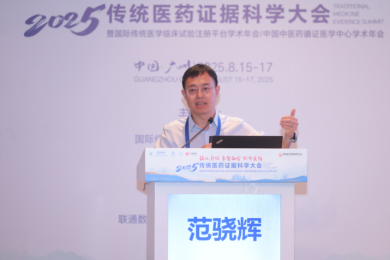
FAN Xiao-hui, Yangtze River Scholar, Director of the Yangtze River Delta Smart Oasis Innovation Center of Zhejiang University, and School of Pharmacy of Zhejiang University, gave a report
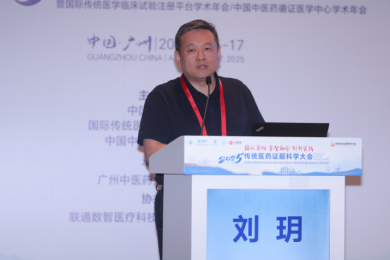
LIU Yue, Vice President of Suzhou Hospital of Xiyuan Hospital of China Academy of Chinese Medical Sciences, made a report
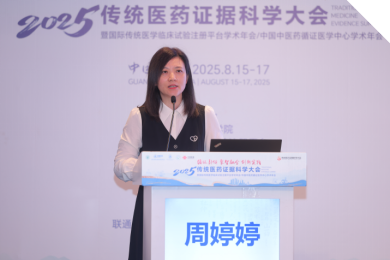
ZHOU Ting-ting, Director of the Shanghai Key Laboratory of Pharmaceutical (Traditional Chinese Medicine) Metabolites, made a report
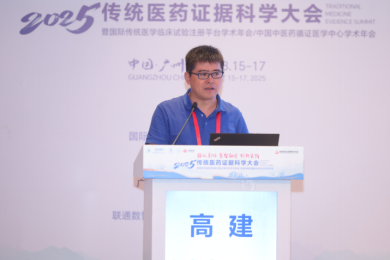
GAO Jian, director of Shanghai Children's Medical Center Affiliated to Shanghai Jiao Tong University School of Medicine, made a report
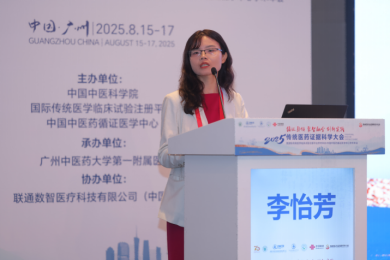
LI Yi-fang, Yangtze River Scholar and Deputy Director of Guangdong Provincial Engineering Research Center for Disease Susceptibility and Traditional Chinese Medicine R&D Engineering Technology Research Center, made a report
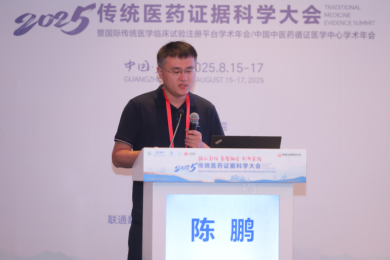
CHEN Peng, a researcher at the Medical Experimental Center of the China Academy of Chinese Medical Sciences, made a report
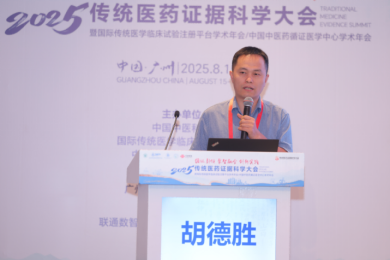
HU De-sheng, Director of the Department of Integrative Traditional Chinese and Western Medicine, Union Medical College Affiliated to Tongji Medical College of Huazhong University of Science and Technology, made a report
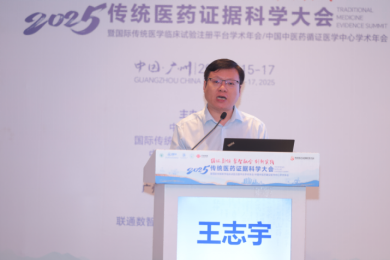
WANG Zhi-yu, Vice President of the Breast Disease Specialist Hospital of Guangdong Provincial Hospital of Traditional Chinese Medicine, made a report
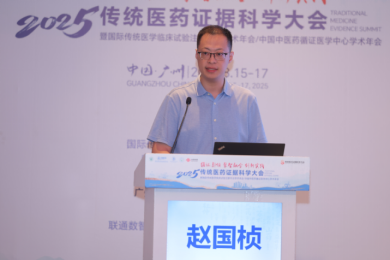
ZHAO Guo-zhen, assistant researcher of CCEBTCM, made a report
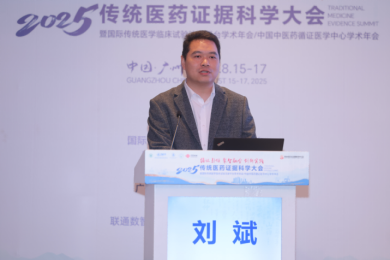
LIU Bin, assistant researcher of CCEBTCM, made a report
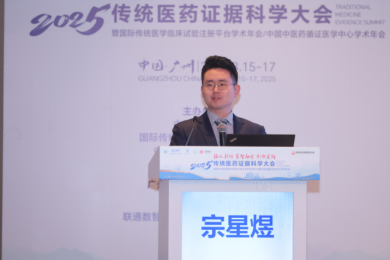
Dr. ZONG Xing-yu of CCEBTCM gave a report
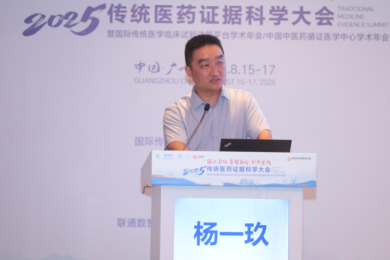
YANG Yi-jiu, assistant researcher of CCEBTCM, gave a report
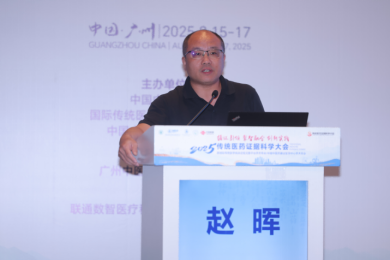
ZHAO Hui, Director of the Comprehensive Office of CCEBTCM, presided over the meeting
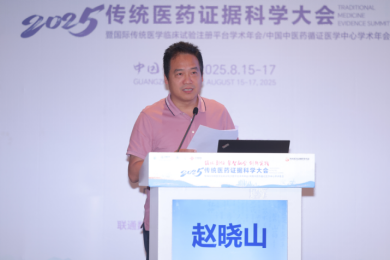
ZHAO Xiao-shan, Director of the Department of Traditional Chinese Medicine, Nanfang Hospital, Southern Medical University, presided over the meeting
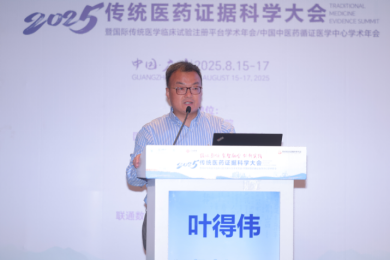
Professor YE De-wei of Guangdong Pharmaceutical University presided over the meeting
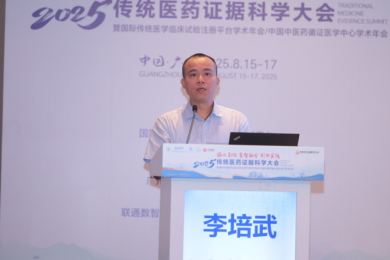
LI Pei-wu, professor and chief physician of the First Affiliated Hospital of Guangzhou University of Chinese Medicine, presided over the meeting
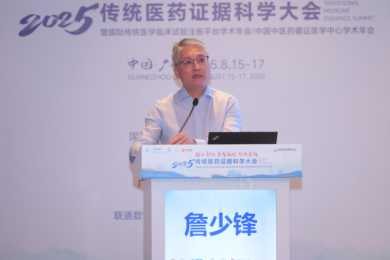
ZHAN Shao-feng, chief physician of the First Affiliated Hospital of Guangzhou University of Chinese Medicine, presided over the meeting
The successful holding of the first Traditional Medicine Evidence Science Conference has built a high-level exchange platform for evidence-based research on traditional medicine. Through the linkage of the main forum, parallel forums, closed-door meetings and other links, it gathers the wisdom of top experts at home and abroad, focuses on the integration and innovation of evidence-based medicine and traditional medicine, releases a number of "AI+" innovation achievements, launches key plans, and promotes the intelligence, standardization and internationalization of evidence-based research in traditional medicine. The conference promoted multidisciplinary cooperation, formed consensus and solutions in the construction of evidence systems, new drug research and development, medical insurance policies, etc., provided key support for breaking the bottleneck of TCM development, improving service capabilities and international influence, helped TCM inheritance, innovation and high-quality development, and contributed Chinese wisdom and solutions to the development of global traditional medicine.
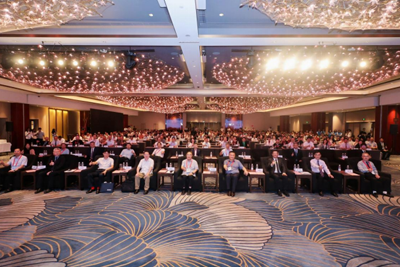
The First Traditional Medicine Evidence Summit (TES)
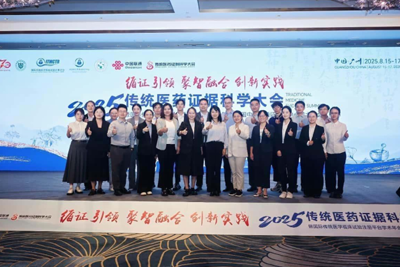
Operation Team of ITMCTR
